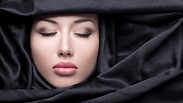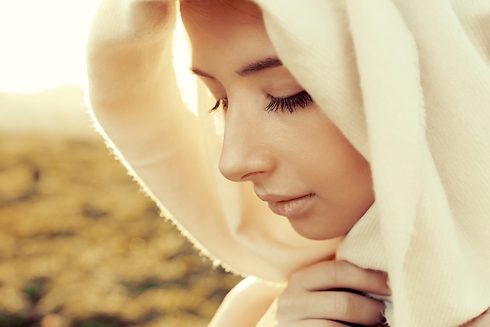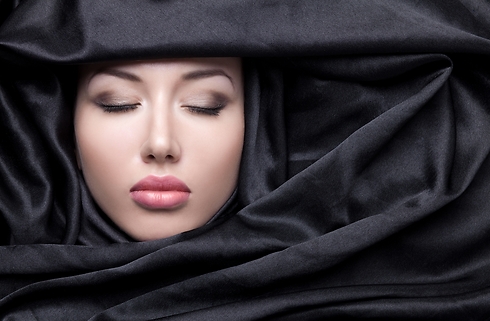
Palestinian lesbians on the margins of two societies
How could these women find a sense of belonging when nationalism and conservatism impose from both sides, trying to force them into a box that cannot contain their unique individualism?
A few months ago, I went to a party with some friends in the north and noticed from the corner of my eye a very impressive woman.
Over the course of the evening she drew a group of women around her, and it was clear that she possessed both charisma and an interesting personality. "Do you see her?" shouted in my ear with the subtlety of a truck driver, interrupting my musings.
"Her name is Samira. And you won't believe this, but she's an Arab. You understand? She's an Arab and a lesbian. And I think she's also an actress. Have you ever seen anyone like that?"
"Someone like that?" I scoffed. "You think there's only one like that? Maybe we're just not aware of them? It's not like they're walking around with a sign saying, 'I'm both a lesbian and an Arab'. There must be lots like her and we're not aware enough to know. If we don't make a big deal out of it, it won't be a big deal."

"Why are you pretending?" exclaimed my friend. "You've never seen someone like that in your life, so don't give me that nonsense. Maybe in a few years it won't be a big deal, but for now it is a big deal."
The friend was right. Over the following weeks, Samira Saraya, the woman I'd seen at the party, entered the public consciousness with her debut performance in Shira Geffen's film "Self Made." The film deals with political issues, class relations in society and sexual identity. Samira plays a young Palestinian who works in a furniture factory and struggles to find herself, and she gave numerous interviews upon the film's release.
The interviews primarily focused on her identity and the complexity she represents. She is a lesbian and an Arab. But she is also a native of Haifa and a Tel Aviv-based actress who has many siblings. And there's a lot to ask about. Samira symbolizes many conflicts in our society. The thing is that one symbol cannot represent an entire group. I became curious to hear more stories in order to understand what it means to be different among the different in Israel.
I embarked on my mission with many good intentions and a desire to be exposed to the stories of lesbian Palestinians who are citizens of Israel but when I searched for interviewees with the help of friends around the country, I found myself in a fairly amusing and strange situation.
"Sure I know lesbian Arabs, talk to Samira Saraya," said a friend from Jerusalem. "I know Samira Saraya, you can interview her," said another friend.
So I was at square one. I gave up and stopped searching. I was forced to agree with the friend from the party, until one evening I sat in a Haifa pub with another friend and she suddenly grabbed me and said: "You see her outside? The one sitting at the high table? So, she's both an Arab and a lesbian. Crazy, isn't it? You have to write an article about her."
Not heaven for everyone
D., a 27-year-old student, told me she was born and raised in Haifa and was not involved in the Tel Aviv social scene. "If you ask me what it means to be a Palestinian lesbian in Israel, I'm not sure I have an answer for you," she said. "I know my life here and that's all. The gay community in Israel commits a sort of pink-washing, a kind of blurring.
"What do I mean?" she asked before explaining, "From the side it looks like heaven for gays and lesbians here. There are pride parades and everyone seems liberal. In reality, that's only true for specific groups. Only people of very specific types can feel comfortable here. It's only heaven for people with a certain status. I'm not part of that."
I tried asking if she feels a part of anything, if there is a community that succeeds in giving her a feeling of belonging. "There's a lot of life outside of Tel Aviv. Just like there are Druze, Bedouin, Christians, Muslims - we aren't only one thing and each individual can find herself. And where I blossomed, an NGO called ASWAT, I can tell you that we make significant efforts against pink-washing and offer something different."
ASWAT ("voices" in Arabic) has existed as an independent NGO since 2002, offering meetings for Palestinian lesbians who try to form a unified identity out of the difficult reality of being marginalized as a national minority group in Israel and against the conservative sentiments of a traditionally patriarchic Arab society.
D. says there is also space for bisexual or transgender women and whoever is ready to take part in social activities for women with a desire to change society. "Just like there are many groups within Arab society, and there are many groups within Jewish society - some are more religious than others, there are rich and poor - it's like that with us as well; there's no one identity. Every individual can come participate if she wishes. It doesn't matter if you identify as a lesbian, bisexual or don't identify with any definition at the moment. And maybe none of these definitions are even needed. That's ok too."
From Taybeh to Tel Aviv
I came back to Tel Aviv full of insight. It seems we have a long way to go until we can get to know these women intimately. I understood that I wouldn't find what I was trying to find and maybe that says something in and of itself. Meanwhile the "ping!" of Facebook's chat application in the background told me I had a message.
"I found someone for you. She would be really happy to be interviewed but she says she prefers to define herself as bisexual, is that alright?"
Of course it's alright. I'd already learned that there's a wide variety of identities in the sand bag called Israeli society. Attempts to cram all of us into templates and definitions don't stand against the test of reality anyway. And that's how I got to R., 25, a waitress in a pub in southern Tel Aviv. The pub is connected to Palestinian activists. R. was born in Taybeh, in the West Bank, and moved to Tel Aviv one year ago. Since then, she's worked in the pub and watches from the sidelines as people around her try to define themselves in contrast to society's old hegemony.
I asked her to tell me what it means to her to be a Palestinian woman in Israeli society and what difficulties that presents. "To tell you the truth, I don't feel part of anything but I'm here. I'm a woman. I live in Tel Aviv. And yes, I am also a Palestinian so of course I connect with the Palestinian struggle. At the moment I don't really have any friends from Taybeh; I don't have any connection to the culture and my parents usually come visit me here.
"My friends as well - everyone's here in Tel Aviv. Some of them are Palestinians and some of them are Jews. And actually, even my Palestinian friends turned into 'Tel Avivans' with time; they just want to fit in."
I asked R. if the move to Tel Aviv was unavoidable in her eyes. "Look, if we look at north Africa, Algeria, Morocco, Iraq - in Poland as well - there has been a movement of people from the villages and from the peripheries, young people who go, with or without money, with or without education, and they moved to the big city in order to move forward, in order to make money. Many people, even today, are looking to move to more central locations in their own countries.
"And there's no arguing, Tel Aviv has everything. I live half-an-hour from here, I don't have a car and public transit is terrible, I mean specifically from Taybeh. Maybe if I lived in Kfar Saba, I would still live with my parents and manage to save money. But wherever you go people are coming to the big cities. So as far as I'm concerned, Tel Aviv is the center. Jerusalem isn't for me; Jerusalem isn't as nice because of the heavy atmosphere there."
R. wasn't fleeing from the environment she grew up in, she was simply on the path of progress. I asked her to tell me about her relationship with her parents, what she chooses to share with them and how they receive her. "I was once in a long relationship with a man so I didn't have to come out of the closet yet because as far as they were concerned I was straight. When I started going out with women I was already out of the house. So, I didn't have the fear of 'what my parents would say' in my head because I was already in Tel Aviv.
"I haven't been in a long relationship with a woman yet. And for now I don't have a partner for whom I would need to come out of the closet so there's no reason to discuss sex with my parents. I don't want to start challenging my entire world view on my sexual orientation right now if there's no reason to. As long as there's no one I need to bring home who doesn't fit the definition of a straight guy and all that - so, there's no reason to.
"I speak to them in general about sex and they know that I have thoughts regarding relationships with women but I've never brought it in front of their faces. Since I already 'came out of the closet' in the past when I had a Jewish boyfriend, they have a little more understanding, more background to relate to. It's possible that it will be hard for them if I find myself in a relationship with a woman in the end but not to the point they would disown me. We may have problems with communication. They've never dealt with it before so I don't expect them to understand it completely."
R. is happy with the life she's built for herself in Tel Aviv. Her political opinions are wrapped up in her identity but she doesn't remain active in any organization or movement. "I used to be more active in feminist groups. Today, I'm less interested. I can tell you that I've got to know Palestinian lesbians in Tel Aviv through friends and group activities but there isn't any community that I belong to. You have to be wherever you're comfortable, wherever you find yourself and at the moment, I'm in a place that's good for me."
The stories of R. and D. teach us about the differences that exist between these women. And this is probably just the beginning. Any attempt to paint their identities in one color would return a rainbow of colors with a variety of identities and viewpoints. After all, these are just two stories from within a large minority, but the fact that these two women don't feel the need to put themselves in a box taught me a lot about how we look at our identities vs. societal conventions.
The double marginality of these women is only in relation to the norm as we tend to imagine it. And maybe it's possible to imagine a different reality, one in which there are no clear lines or borders and there a lot more freedom and leeway.











